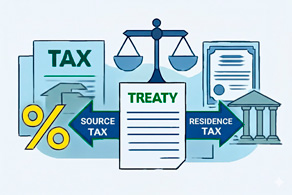What is double taxation of investments and how to avoid it
Recently, governments have increasingly tightened their grip on their citizens' incomes for tax purposes, regardless of whether that income is earned domestically or abroad. This sometimes results in double taxation.

What is it: Double taxation is when the same income (for example, dividends, interest on a deposit) is taxed in two countries: where the income was received and where you live.
Why this happens: The source country automatically withholds its tax, and your country of residence, by law, also wants to tax this income.
How this is usually resolved: countries have double taxation treaties ( check whether your country and the country where you earned your income have a similar agreement ). Under these agreements, you pay "whatever is required at home," and any withholdings abroad are credited (up to a maximum of the "domestic" rate).
If you borrow more than you are allowed to borrow abroad, you can return the excess in the country where the investment was made by filing a refund request.
If there's no agreement , sometimes offsetting is still allowed (depending on your country), but sometimes it's a true "double offset." In this case, the solution is to complete the necessary forms in advance, select instruments/ ETFs with the "right" jurisdiction, or make a refund at the source.
Example: You received $100 in dividends from Apple stock. The US withheld $15 (under certain conditions, 15% is subject to availability of a W-8BEN). In Poland, the dividend tax is 19%. This means you only pay the difference—$4—not the full $19.
With the default rate, you'll have to pay $30 (30%) on the same $100 dividends. In Poland, excess tax paid is not refunded, and only 19% is taken into account. Refunds for overpaid taxes are processed through your broker or the US Internal Revenue Service. The procedure is quite complex, so it's best to clarify all the details before purchasing securities.
How is other foreign income taxed?
Not all income earned abroad is taxed under the same scheme as stock dividends.
Table using Poland as an example:
| Type of income | Tax at source | Tax in the investor's country | How to avoid double taxation |
| Dividends on foreign shares | Usually 10-30% | Taxed as capital income | Submit a residency form (e.g. W-8BEN), indicate the withheld tax on the return |
| Coupon income on bonds | 0–15% or 0% with benefits | Taxed as interest income | Check the contract and withholding, offset or refund tax at source |
| Interest on deposits in foreign banks | May be held by the bank's country | Taxed at the interest rate | Obtain confirmation of deduction and apply the offset |
| Profit from selling stocks, ETFs, and cryptocurrencies | Often 0% for non-residents | Capital gains tax | Include profit in your tax return if it was not withheld abroad – pay only “at home” |
| Physical investment gold | No tax if stored for more than 6 months | Sale may be released after the holding period | Maintain a minimum ownership period to avoid paying tax when selling |
| Non-physical gold (ETF, ETC, Revolut Gold) | Can be held by a platform | Taxed as income from financial instruments | Maintain records and proof of deductions for credit or refund |
💡 Before investing, check which taxes are withheld at source and which can be offset – this will protect you from double taxation.
It is clear that the country in which you are a resident may have different tax rates and a different reporting scheme, but the calculation principle will be the same.
Therefore, to avoid becoming a victim of double taxation, before investing, clarify the following points:
| What needs to be clarified | Why is this important? |
| Tax residency and TIN | Determines where you are required to pay taxes and at what rates credits and exemptions apply |
| Double Taxation Agreement (DTT) | Gives the right to reduce the tax at source and not pay it a second time "at home" |
| Withholding rates in the source country | Some countries withhold up to 30% without submitted residency forms |
| Forms of tax residency | Submit to a broker (e.g. W-8BEN or Certificate of Residency) to obtain reduced tax rates |
| Does the broker apply source tax incentives? | If not, the tax will be withheld in full, and you will have to process the refund yourself |
| Storage of documents and reports | Keep statements, reports, and exchange rates—this is proof for a tax credit or refund |
📘 Tip: Before purchasing foreign stocks or ETFs, check tax rates, contracts, and documents to avoid double taxation and simplify reporting.
Today, tax authorities across the world actively exchange information on accounts and investments. International agreements such as CRS and FATCA make income concealment virtually impossible.
Therefore, it is especially important to correctly account for foreign income, file tax returns, and take advantage of double taxation agreements—this protects against fines and unnecessary problems.
One option for tax optimization may be the use of CFD contracts .

